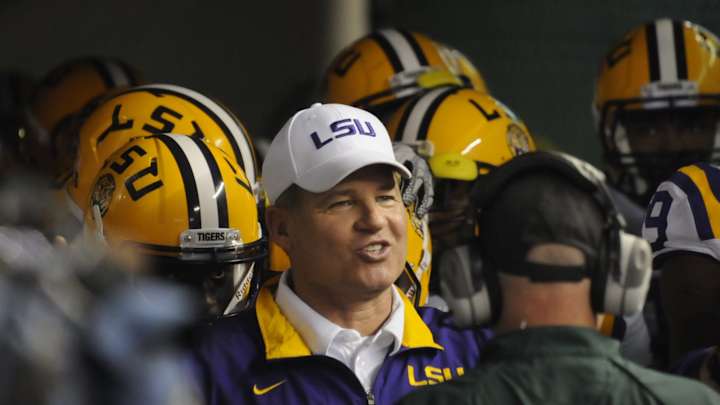LSU Releases Report on Sexual Misconduct Investigation from Husch Blackwell

On Friday, LSU released it's report from lawfirm Husch Blackwell on the mishandling of various sexual misconduct claims within the university.
As part of the 148-page report, Husch Blackwell issued 18 recommendations for LSU to better its handling of Title IX operations. Among the recommendations are:
I. Clarify Reporting Responsibilities
II. Streamline and Centralize Reporting and Support Resources
III. Increase Staffing and Support
IV. Increase Awareness of Resources and Processes
V. Enhance Oversight & Evaluation
VI. Education & Training
To read a full review of how the university plans to improve its handling of sexual harrassment allegations, click here.
LSU president Tom Galligan also announced at the board meeting that the university would be complying with the No. 1 recommendation of building out a competant Title IX staff by adding these positions:
1. A case manager
2. Administrative support and additional investigators
3. Deputy Title IX coordinator
The university also announced it'd be suspending Senior Associate Athletic Director Verge Ausberry for 31 days and and Senior Associate Athletic Director Miriam Segar for 21 days. While suspended, the two will undergo sexual violence training.
In the report from Husch Blackwell, it was found that Segar instructed LSU receivers coach Mickey Joseph and women's tennis coach Julia Sell to keep Drake Davis separated from his girlfriend who played on the tennis team instead of reporting the abuse to LSUPD.
Current #LSU assistant Mickey Joseph is mentioned briefly in the report. He was put in the "impossible position," the report says, of keeping Drake Davis away from his former girlfriend and LSU tennis player (Jade Lewis), who had alleged abuse. pic.twitter.com/1bI1511Lb0
— Ross Dellenger (@RossDellenger) March 5, 2021
Ausberry was at similar fault. It was initially reported by The Advocate that Davis texted Ausberry that he had struck his girlfriend that played on the tennis team at the time, retracted his statement to Ausberry and Ausberry didn't pursue the matter any further.
LSU athletic director Scott Woodward issued a statement and also said during the board meeting he was "embarrassed by what's happened in the past." He also stated that he has "great confidence that Ausberry and Segar can "get it right going forward."
Statement from #LSU deputy AD Verge Ausberry. pic.twitter.com/g3RfV1RSlo
— Ross Dellenger (@RossDellenger) March 5, 2021
One of the other student athletes who was a major part of the report was former running back Derrius Guice. Guice is currently facing multiple allegations of sexual harassment while at LSU and domestic violence as a member of the Washington Redskins.
As part of the Husch Blackwell report, Guice sexually harassed a 70-year-old attendant during a high school championship game in 2017, just before his final game with the program in the Citrus Bowl. It was reported to the university but Guice never went through proper disciplinary measures.
These are just a few of the latest details provided as reports of sexual misconduct against former LSU football coach Les Miles went public on Thursday. In the report from USA Today and The Advocate, a 2013 internal investigation into Miles revealed that the former LSU coach had been accused of kissing a female student worker on two occasions and became very active in the hiring process of the student workers, wanting them to have a certain look.
As a result, board members agreed to put a stop to Miles' actions by ordering him not to hire female workers, stop being alone with female workers and had to attend eight, one hour sessions which he had to pay for himself.
Miles, who's now the head coach at Kansas, has vehemently denied the accusations, releasing a statement to the public saying he never kissed the student worker and that he was a mentor. According to the investigation from Taylor Porter, they were "unable to determine" what happened in Miles' car, where the student worker said Miles had kissed her.
"As the Report concludes, the allegation that coach Miles attempted to kiss the woman was supported by no evidence and warranted no discipline: 'We do not believe under existing law and the terms of the contract there is cause to discipline and/or terminate' Coach Miles," the statement from Miles' representation read in part.
The Husch Blackwell report found that former athletic director Joe Alleva thought the best move was to fire Miles in 2013 with cause because of his "inappropriate behavior."
Former #LSU AD Joe Alleva recommended that Les Miles be fired for cause because of his "inappropriate behavior." pic.twitter.com/CAirjP0BAb
— Brooks Kubena (@BKubena) March 5, 2021
The investigation ultimately concluded that Miles used "poor judgment in placing himself (and the student employee) in a situation in which the student employee might be uncomfortable and/or he can be subject to such complaint."
Because there was no confirmation of what actually happened in the car, there were no legal violations to hold against Miles which lead to him staying on as LSU's coach.
To read the full 148 page report, click here.

Glen West has been a beat reporter covering LSU football, basketball and baseball since 2017. West has written for the Daily Reveille, Rivals and the Advocate as a stringer covering prep sports as well. He's easy to pick out from a crowd as well, standing 6-foot-10 with a killer jump shot.
Follow @glenwest21